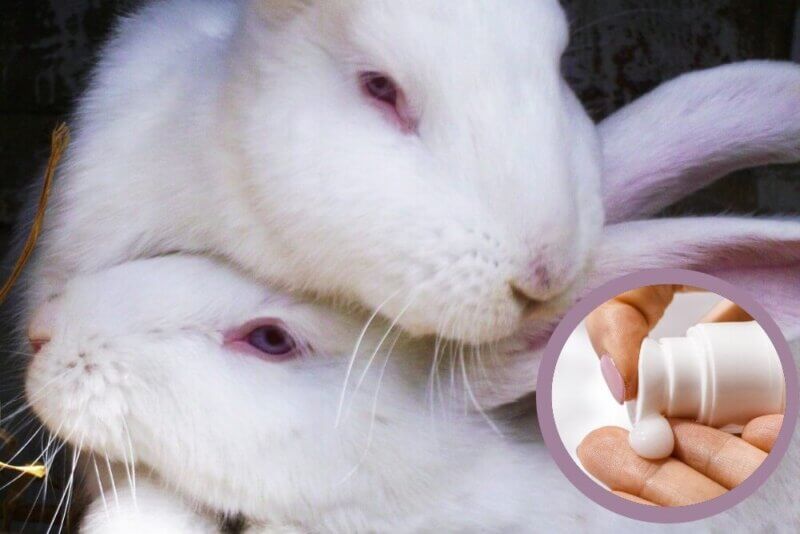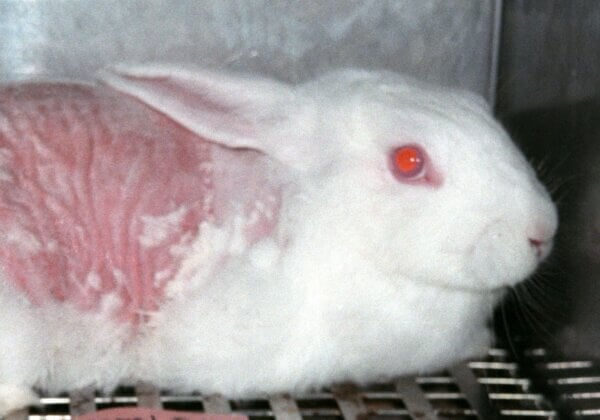
La Cour de justice de l’Union européenne a prononcé son jugement contre Symrise AG, un producteur d’ingrédients de produits cosmétiques qui demandait l’annulation d’une décision de justice exigeant que ses produits soient testés sur des milliers d’animaux.
Ce verdict accablant a tourné le système judiciaire en dérision en discréditant l’interdiction autrefois historique de l’UE des tests de cosmétiques sur les animaux.
Sur quoi portait le dossier ?
L’Agence européenne des produits chimiques (ECHA) a mandaté Symrise AG, un industriel allemand, pour qu’il teste deux de ses ingrédients de crèmes solaires sur des milliers d’animaux. Symrise AG a contesté la position de l’ECHA auprès de la chambre de recours de l’ECHA, et le PETA International Science Consortium Ltd est intervenu pour soutenir l’entreprise au cours de l’audition. La chambre a maintenu la décision initiale mais, avec le soutien du Science Consortium, Symrise a fait appel auprès de la Cour de justice de l’Union européenne. Consultez l’article ci-dessous pour en savoir plus sur le dossier et le rôle qu’a joué PETA.
Qu’est-ce que cela signifie pour les animaux ?
En un instant, la cour a condamné des milliers de souris, de lapins et de poissons à une souffrance atroce et une mort certaine dans le cadre d’expériences cruelles et a rendu l’interdiction historique de tester des cosmétiques sur les animaux complètement inutile.
Les souris, les rats, les lapins et les poissons sont toujours contraints d’ingérer des ingrédients de produits cosmétiques pour répondre aux exigences de la réglementation REACH pour les substances chimiques.
Nous condamnons la décision de la Cour de justice de l’Union européenne qui ne respecte pas l’objectif de l’interdiction des tests de cosmétiques sur les animaux, qui était de garantir que seules les méthodes qui n’utilisent pas d’animaux soient utilisées pour déterminer si les cosmétiques sont sûrs.
Et la suite ?
PETA continuera ses efforts pour protéger les animaux et les droits des citoyens européens de se procurer des cosmétiques non testés, et ce même si l’ECHA et la Cour de justice de l’Union européenne semblent indifférentes aux valeurs contemporaines.
Vous pouvez nous aider à faire pression sur les décisionnaires. Envoyez un message au commissaire européen à l’Environnement pour lui dire ce que vous pensez de ces pratiques qui constituent à empoisonner et tuer des animaux lors de tests cruels et loin d’être fiables :
AGISSEZ CONTRE LES TESTS DE COSMÉTIQUES SUR LES ANIMAUX
Mise à jour du 22 novembre 2022 : le 22 novembre, l’interdiction des tests de cosmétiques sur les animaux dans l’EU a été défendue devant la Cour de justice de l’Union européenne, alors que Symrise AG contestait la demande de l’Agence européenne des produits chimiques que l’entreprise teste deux ingrédients communs des crèmes solaires sur 5 500 animaux.
Dr Julia Baines, responsable des politiques scientifiques de PETA Royaume-Uni, a assisté les juristes sur ce dossier. En allant devant le tribunal, nous demandons à l’EU de maintenir l’interdiction des tests cruels et inefficaces sur les animaux.
L’issue de ce dossier fera jurisprudence et n’affectera pas uniquement les tests de l’homosalate et du salicylate d’octyle, elle clarifiera également la manière dont le règlement concernant l’enregistrement, l’évaluation et l’autorisation des substances chimiques, ainsi que les restrictions applicables à ces substances (REACH) sera interprété pour tous les ingrédients cosmétiques.
Maintenir l’interdiction des tests de cosmétiques sur les animaux signifierait que le REACH ne peux pas être utilisé pour la compromettre. Les entreprises cruelty-free n’auraient pas à changer la formule de leurs produits ou à chercher d’autres fournisseurs et le Royaume-Uni, l’Australie et les autres pays aux politiques basées sur l’interdiction de l’EU recevraient un message fort contre les dérogations.
Le public rejette massivement la cruauté de l’expérimentation animale : plus de 1,2 million de citoyens de l’union européenne ont soutenu l’initiative citoyenne européenne demandant à la Commission européenne de protéger et de renforcer l’interdiction des tests sur les animaux.
Mise à jour du 19 août 2021 : les cosmétiques cruelty-free sont menacés depuis que l’Agence européenne des produits chimiques (ECHA) et la Commission européenne ont annoncé leur politique nécessitant des tests sur les animaux pour des ingrédients de produits cosmétiques. Le entités PETA ont saisi chaque opportunité de lutter contre cette politique.
En 2018, lorsque Symrise AG a contesté la demande de l’ECHA que deux ingrédients soient testés sur 5 500 animaux, le PETA International Science Consortium e.V. est intervenu sur le dossier auprès de la chambre de recours de l’ECHA. Symrise a désormais amené la décision devant la Cour de justice de l’Union européenne et l’intervention du Science Consortium a une fois encore été approuvée pour ce dossier qui fera jurisprudence.
PETA se réjouit que la politique de la Commission européenne et de l’ECHA (qui discrédite l’interdiction des tests sur les animaux et de la commercialisation pour des produits cosmétiques dans l’UE en exigeant que les ingrédients de produits cosmétiques soient testés sur des animaux) soit remise en cause.
Les tests sur les animaux demandés pour ces deux ingrédients ne sont malheureusement que la partie visible de l’iceberg. Mais PETA applaudit la décision de Symrise d’amener ce dossier devant la cour.

Publication originale
Deux jugements récemment publiés par la chambre de recours de l’Agence européenne des produits chimiques (ECHA) ont décrété que les ingrédients utilisés uniquement pour des cosmétiques peuvent être testés sur les animaux dans le cadre du règlement concernant l’enregistrement, l’évaluation et l’autorisation des substances chimiques, ainsi que les restrictions applicables à ces substances (REACH). Les tests sur les animaux pour des ingrédients cosmétiques sont interdits dans l’UE depuis 2013 dans le cadre de la réglementation sur les produits cosmétiques, mais ces jugements (des interprétations terriblement erronées de la loi) permettront concrètement aux producteurs et aux autorités régulatrices d’ignorer cette interdiction.
Que s’est-il passé, qu’est-ce que cela signifie pour les animaux, et que faire pour les aider.
Qui en souffrira ?
En conséquence directe de ces jugements, plus de 5 500 rats, lapins et poissons devront être utilisés pour de nouveaux tests, certaines femelles gestantes seront forcées d’ingérer des ingrédients de cosmétiques, puis elles seront tuées et disséquées, tout comme leurs petits à naître.
Ces jugements ouvrent également la porte à un plus grand nombre de tests sur les animaux dans le cadre du REACH. Chaque année, des centaines de cosmétiques contiennent des produits qui sont nouveaux sur le marché et pourraient nécessiter des tests dans le cadre du REACH, coûtant la vie à des milliers d’animaux.
De quels ingrédients s’agit-il ?
Les ingrédients visés par l’appel, l’homosalate et le salicylate d’octyle, sont utilisés dans les crèmes solaires et d’autres cosmétiques pour absorber les rayons ultraviolets B (UV-B) du soleil.
De nombreux producteurs et marques seront probablement affectés par ces décisions, il est donc crucial que les consommateurs utilisent la base de données internationale en ligne Beauty Without Bunnies de PETA États-Unis afin de connaître les entreprises qui refusent que leurs produits soient testés sur les animaux où que ce soit dans le monde, et quelle qu’en soit la raison.
Les entreprises certifiées non testées sur les animaux par PETA États-Unis ne mènent ou ne commandent pas de tests sur les animaux pour leurs ingrédients, leurs formules ou leurs produits finis et s’engagent à ne pas le faire à l’avenir.
Ces ingrédients ont-ils vraiment besoin d’être testés sur les animaux ?
Selon l’ECHA, ces tests seraient nécessaires afin d’assurer la sécurité des travailleurs qui produisent ou manipulent les substances, mais ce n’est pas tester ces ingrédients de cosmétiques sur des milliers d’animaux qui les protégera. En raison de différences biologiques fondamentales entre les humains et les autres animaux, les résultats des tests sur les seconds ne prédisent simplement pas efficacement les effets sur les premiers.
Les tests de cosmétiques ne sont-ils pas interdits en Europe ?
Depuis 2013, les tests sur les animaux pour des ingrédients cosmétiques sont interdits dans l’UE dans le cadre de la réglementation sur les produits cosmétiques. La Cour de justice de l’Union européenne a précisé en 2016 que la vente de produits cosmétiques reposant sur les résultats de nouveaux tests sur les animaux à des fins d’évaluation de la sûreté est interdite dans l’UE. Pourtant l’ECHA, la Commission européenne et maintenant la chambre de recours de l’ECHA ont mal interprété la loi et ont discrédité les interdictions, renvoyant les animaux dans les laboratoires pour des tests de cosmétiques inutiles et cruels.
La réglementation sur les produits cosmétiques a un poids politique considérable et reflète la volonté du peuple et du Parlement européen. L’interdiction des tests de produits cosmétiques sur les animaux et de la vente de produits cosmétiques reposant sur des données issues de tests sur les animaux dans l’UE montre que la population accorde plus d’importance à la vie d’un animal qu’à un tube de dentifrice ou de crème solaire.
Permettre les tests d’ingrédients de cosmétiques dans le cadre de REACH revient à faire fi de la réglementation sur les produits cosmétiques et à totalement discréditer l’objectif de ces interdictions.
C’est simple : seules les méthodes non-animales devraient être employées lorsqu’il s’agit de commercialiser un nouveau produit cosmétique. Si ce n’est pas possible, l’ingrédient ne devrait pas être utilisé.
Que fait PETA ?
En 2014, nous avons révélé que l’ECHA et la Commission européenne autorisaient les tests d’ingrédients de produits cosmétiques sur les animaux. Depuis, nous travaillons pour mettre fin à ces expérimentations odieuses en faisant pression sur la Commission européenne et l’ECHA afin que la réglementation sur les produits cosmétiques et son interdiction des tests sur les animaux soient respectées.
Le PETA Science Consortium International e. V. (dont PETA France est membre) est intervenu sur le dossier d’appel concernant ces décisions récentes sur les tests. Bien que la chambre de recours ait rejeté de nombreux arguments présentés par le Science Consortium et l’entreprise responsable du recours face à la demande de tests, PETA et le Science Consortium explorent les autres possibilités de résoudre le litige.
Les entités PETA demandent aux entreprises de jouer un rôle en utilisant des méthodes sans animaux et en finançant le développement de ces méthodes. Nous encourageons aussi les entreprises à utiliser des ingrédients dont la sûreté a déjà été prouvée ou de créer une nouvelle formule pour les produits qui le nécessitent afin de remplacer les ingrédients de cosmétiques testés sur les animaux dans le cadre du REACH. Ne pas tester sur les animaux est une option pour chaque entreprise.
Bien que ces décisions soient un énorme pas en arrière, nous sommes plus déterminés que jamais à mettre fin à tous les tests de cosmétiques sur les animaux.
Comment nous aider ?
Utilisez uniquement des produits non testés et vérifiez la base de données de PETA États-Unis en cas de doute.
Aidez-nous à montrer la force de l’opposition publique aux tests de produits cosmétiques sur les animaux : demandez à la Commission européenne et à l’ECHA de respecter la réglementation sur les produits cosmétiques et d’interdire les tests d’ingrédients de produits cosmétiques sur les animaux, peu importe les circonstances :
Article écrit par :
- Marie J. - PETA France
Sources :
- PETA France
Publié le 25/11/2023 12:52










Commentaires